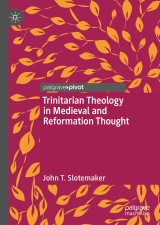Details

Trinitarian Theology in Medieval and Reformation Thought
|
CHF 71.00 |
|
| Verlag: | Palgrave Macmillan |
| Format: | |
| Veröffentl.: | 03.07.2020 |
| ISBN/EAN: | 9783030477905 |
| Sprache: | englisch |
Dieses eBook enthält ein Wasserzeichen.
Beschreibungen
<p>This book is an introduction to trinitarian theology as it developed from the late medieval period. John T. Slotemaker presents an overview of the central aspects of trinitarian theology by focusing on four themes: theological epistemology, the emanations in God, the divine relations, and the Trinity of persons. He does so by exploring a broad range of theological opinions on each subject and delineating the options that existed for medieval theologians from the early thirteenth century through the sixteenth. He argues that despite the diversity of opinion on a given subject, there is a normative theological center that grounds late medieval trinitarian theology. This center consists of theological developments involving the adoption of Peter Lombard’s <i>Sentences</i> as a theological textbook, the conciliar decisions of Lateran IV, and a shared Aristotelian philosophical background of Western trinitarian theology.</p><br>
<p>1. Introduction</p>
<p>2. Theological Epistemology</p>
<p>3. Emanations and Relations</p>
<p>4. Persons and Personal Distinction</p>
<p>5. Conclusion</p>
<p> </p>
<p> </p>
<p>2. Theological Epistemology</p>
<p>3. Emanations and Relations</p>
<p>4. Persons and Personal Distinction</p>
<p>5. Conclusion</p>
<p> </p>
<p> </p>
<p><b>John T. Slotemaker</b> is Associate Professor of Medieval Christianity at Fairfield University. His previous books include <i>Anselm of Canterbury and the Search for God</i> (2018), and with Jeffrey C. Witt, <i>Augustine in Late Medieval Philosophy and Theology </i>(2017),<i> Robert Holcot </i>(2016), and<i> A Companion to the Theology of John Mair </i>(2015).</p>
This book is an introduction to trinitarian theology as it developed from the late medieval period. John T. Slotemaker presents an overview of the central aspects of trinitarian theology by focusing on four themes: theological epistemology, the emanations in God, the divine relations, and the Trinity of persons. He does so by exploring a broad range of theological opinions on each subject and delineating the options that existed for medieval theologians from the early thirteenth century through the sixteenth. He argues that despite the diversity of opinion on a given subject, there is a normative theological center that grounds late medieval trinitarian theology. This center consists of theological developments involving the adoption of Peter Lombard’s <i>Sentences</i> as a theological textbook, the conciliar decisions of Lateran IV, and a shared Aristotelian philosophical background of Western trinitarian theology.<p></p><div><br></div>
<p>Provides an introduction to medieval and early modern trinitarian theology</p><p>Argues that medieval and early modern trinitarian theologies share much in common</p><p>Engages with a diverse group of thinkers to provide the reader with different philosophical and theological views between 1000 and 1550</p>


















